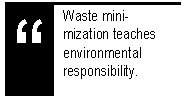
|
There are a number of reasons.
Waste minimization and pollution prevention are environmentally responsible. By reducing wastes at the source, you are taking the most effective step towards eliminating wastes that would otherwise be released to the environment. Schools are highly visible members of the community, and waste minimization provides the opportunity to set an example for the community, even if a school generates relatively little waste. Practicing waste minimization and pollution prevention in schools teach environmental responsibility. By emphasizing the importance of these approaches to your students, you can help instill habits that will be of value the rest of their lives—in the laboratory, on the job, and at home. Waste minimization and pollution prevention encourage safety in the laboratory. Hazardous wastes can be hazardous to students and teachers, as well as to the environment. If you reduce the quantity of hazardous substances they handle, you reduce the hazard. Waste minimization and pollution prevention save money. One effective waste minimization practice is to reduce the quantity of chemicals purchased, which in turn reduces the amount of money that is tied up in chemical inventory. Reducing chemical use will also reduce disposal costs, which can run from $4 to $22 per gallon. Finally, waste minimization and pollution prevention help ensure schools meet legal requirements. There are federal, state, and even local laws that govern waste disposal. Many schools may be violating some of these laws right now. The best way to comply with these laws is to not generate the waste in the first place. So how do you minimize waste? Beginning with the next chapter, we’ll present some specific suggestions. |
 |
Copyright © 1996 Battelle Seattle Research Center. All rights reserved.